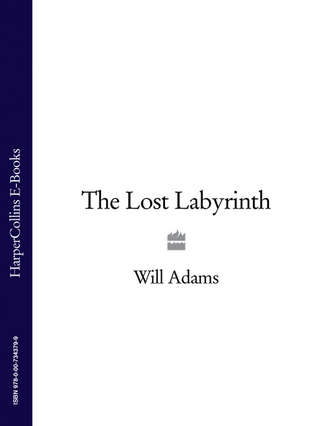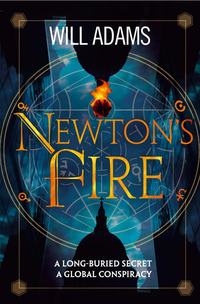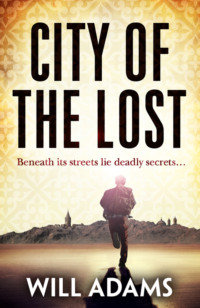
Полная версия
The Lost Labyrinth
The meeting broke up soon afterwards, everyone trading cheerful banter as their mouths watered in anticipation of another Nergadze banquet. Ilya tugged Sandro back by his sleeve. ‘You’d better get me my damned fleece,’ he said.
‘Don’t worry, father,’ Sandro assured him. ‘I’ll get it for you. One way or another, I’ll get it.’
II
‘To success!’ toasted Mikhail, as they stood around the coffee table with their shot-glasses of vodka straight from the freezer.
‘To success!’ they echoed.
The icy viscous liquid chilled and warmed simultaneously Edouard’s throat and chest. His eyes began to water so that he had to blink. He wasn’t used to such strong liquor, but refusing wasn’t an option. Boris refilled their glasses, then Mikhail threw himself into an armchair and put his feet up on the coffee-table. ‘So do you all know what you’re doing here?’ he asked.
‘I do,’ said Boris.
‘Me, too,’ said Zaal.
Edouard settled on the far arm of the sofa, the furthest he could get from Mikhail. ‘I only know what your father told me,’ he said.
‘And that is?’
Edouard allowed himself the faintest of smiles. ‘That we’re here to buy the golden fleece.’
‘You think this is a joke?’ frowned Mikhail.
‘The fleece doesn’t exist,’ said Edouard. ‘It never existed. It was only ever a legend, that’s all.’
‘You’re wrong,’ said Mikhail. ‘It existed. It exists. And we’re going to buy it tomorrow.’
Edouard spread his hands. ‘Look,’ he said, ‘your father and grandfather asked me to come here because I’m an expert in these things. And, as an expert, I’m telling you that there never was any such thing as the golden fleece. It was just a mishmash of local traditions and fanciful storytelling and—’
Mikhail’s face darkened. He pushed himself to his feet and walked over to where Edouard sat on the arm of the sofa. ‘I’m telling you that the golden fleece exists. Are you calling me a liar?’
‘No,’ said Edouard, dropping his eyes. ‘Of course not. I only meant that—’
‘Only meant?’ scoffed Mikhail. He placed the tip of his index finger on the bridge of Edouard’s nose, then gently pushed him backwards. Edouard tried to resist, but there was something inexorable about Mikhail, he felt himself tipping and then he overbalanced and went sprawling, his vodka spilling over his wrist and the floor. ‘You intellectuals!’ said Mikhail, coming to stand above him. ‘You’re all the same. You sneer at everything. But let me tell you something. I spoke to a man this morning, a professor of history as it happens, because I know such things matter to your kind. He’d seen this fleece for himself. He’d travelled to Crete just last week, specifically to see it, to make sure it was for real. He’d held it in his hands and he’d weighed it and felt its texture. It’s for real. He swore on his life that it was for real.’
‘He told you that?’
‘And he had no reason to lie, I assure you.’ Mikhail stared down at him, his pupils triumphant pinpricks of blackness. ‘The fleece is coming here to Athens,’ he said. ‘It’s coming because I’m in Athens, and it’s my destiny to bring it home to Georgia. Some things are written. This is written. Do you understand?’
‘Yes,’ croaked Edouard.
‘Tomorrow morning, we’re going to see it. Tomorrow morning, we’re going to buy it. And then we’re taking it home. Any more questions?’
‘No.’
‘Good,’ said Mikhail. He turned away from Edouard, leaving him lying there feeling limp and soiled.
‘So what’s our plan, then, boss?’ asked Boris, splashing out more vodka.
‘The man who has the fleece is planning to unveil it at a talk tomorrow afternoon. So we’re going to go visit him first thing in the morning, and persuade him to sell it to us.’
‘He’s expecting us, then?’
‘Not exactly. But I know where he’s staying.’
‘What if he doesn’t want to sell?’
Mikhail laughed. ‘He’ll want to by the time I’m through with him, believe me. He’ll be begging us to buy it.’
‘Then why pay for it at all?’ grumbled Zaal. ‘Why not just take it?’
‘Because this isn’t just about the fleece,’ Mikhail told him. ‘This is about the election too. It’s about my grandfather buying the fleece on behalf of the Georgian people, however much it costs, because that’s the kind of patriot he is.’
Edouard’s heart-rate had resettled. He got to his feet, refilled his own glass with vodka, tossed it back, restoring a little courage. ‘This professor you spoke to,’ he said. ‘The one who went to Crete to see it. If I’m to verify the fleece for you, I’ll need to speak to him myself.’
‘Really?’ asked Mikhail. ‘How?’
‘Give me his address. I’ll go visit him.’
‘And what good will that do you?’ asked Mikhail. ‘Unless you take a Ouija board, of course.’
‘Oh Christ!’ muttered Edouard.
Mikhail laughed. ‘Don’t worry. I know what I’m doing.’ He turned to Boris, like a doctor discussing an intriguing case with a colleague. ‘I even got him to write his own note. Amazing what people will do.’
‘So who’s the guy with the fleece, then?’ asked Zaal. ‘The one we’re going to see in the morning, I mean?’
‘His name’s Roland Petitier,’ said Mikhail. He threw Edouard another disdainful glance. ‘Another professor, as it happens.’
The plasma TV was still tuned mutely to the news, showing footage of a white-sheeted body on a trolley being loaded onto an ambulance, while banner headlines ran across the top of the screen. Edouard felt a touch of reckless, almost childish glee as he drew Mikhail’s attention to it. ‘You don’t mean him, I suppose, do you?’ he asked.
III
As Knox returned from the ICU, the lamps in the hospital lobby went into synchronised spasm, shuddering like lightning. Gaille was on a wooden bench, deep in conversation with Charissa. They both looked up as he approached. ‘Well?’ asked Gaille. ‘How is he?’
Knox shook his head. ‘Not so good. But at least he seems to be stable.’
‘And Claire? How’s she holding up?’
‘She’s a bit shaken, as you’d expect.’
‘Any chance that she could talk to the press?’ asked Charissa. ‘Only we need someone sympathetic to be Augustin’s spokesperson.’
‘Not tonight,’ replied Knox. ‘She’s too upset. Maybe tomorrow.’
‘How about you, then?’
Knox took a step back to allow past a porter pushing an elderly woman in a wheelchair, her head tipped to the side, silently weeping. ‘Isn’t spokesperson a lawyer’s job?’
‘I’ll be beside you, believe me,’ said Charissa. ‘But right now our most important task is to get the public on Augustin’s side; and the public has a habit of making assumptions in cases like these. They assume, for example, that only guilty people need lawyers. And they further assume that lawyers will say anything for a fee.’
‘Aren’t you exaggerating?’
She shook her head emphatically. ‘Did you know that the jury system started as a popularity contest? The party with the most supporters won the case, on the basis that good people had more friends. Public opinion still works that way. We need to demonstrate that Augustin has friends who believe in him and who’ll stick by him even in terrible situations. Right now, that means you and Gaille. And, of the two of you, you’ve been his friend much longer.’
‘Fine,’ said Knox. ‘What do I say?’
‘Start by establishing your credentials. You’re Daniel Knox, you discovered Alexander’s tomb, you brought down the Dragoumises. Don’t boast, just let viewers know you’re a man of substance. Then tell them much what you told me: that you’ve been Augustin’s friend for many years, and that the idea of him being responsible for anyone’s death is absurd, but that you know for a fact he couldn’t have been responsible for this death because you were with him all afternoon, collecting his fiancée—not his girlfriend, mind, his fiancée—from the airport, and Petitier was still alive when you found him. Explain that Augustin himself called the emergency services, and that none of this would have happened if a policeman hadn’t groped Claire, leaving him with no choice but to defend her honour. We Greeks understand honour.’
‘Okay.’
‘Try to keep the blame as focused as possible for the moment. One rogue policeman, not the whole department. And, whatever you do, don’t make out like it’s a case of foreigners against Greeks. You’ll lose all sympathy in a heartbeat.’
‘Understood.’
‘Good,’ she nodded. ‘Then let’s go do it.’
NINE
I
For a moment, Edouard feared he’d made a dreadful mistake, bringing the news of Petitier’s death so gleefully to Mikhail’s attention. But Mikhail was too perturbed by what he saw to worry about that. He grabbed the remote, turned up the volume. A studio anchor was discussing latest developments with a reporter on location outside Evangelismos Hospital; but then the reporter broke off and turned to the front steps, down which two women and a man were now walking, their night-time faces a strobe of flashbulbs.
‘That’s Daniel Knox,’ muttered Edouard.
‘Who?’ asked Mikhail.
‘The Egyptologist. He found Alexander the Great and then Akhenaten. You must remember. And that woman to his left. That’s his girlfriend Gaille Bonnard.’
‘She’s pretty,’ muttered Mikhail, his hand drifting to his crotch. ‘I like a girl who makes the most of herself.’
Edouard sat back, intrigued. Knox and Bonnard had turned the world of archaeology upside down with their recent discoveries. Suddenly the prospect of the fleece being genuine seemed significantly higher.
In brisk Greek, Knox introduced his companions, gave his own background, before launching into a spirited attack on the notion that Augustin Pascal had had anything to do with Petitier’s death, not least because he’d been with him all afternoon. Then he looked direct into the camera and added: ‘I love Greece. I love the Greek people. I love being here in Athens. So I’d like to believe what happened to my friend was the handiwork of one rogue policeman.’ He jerked his head at the hospital. ‘But I heard something disturbing just now in Intensive Care. I heard that the police have been arranging the transfer of my friend into their custody, even though they have no way of looking after him properly. So I have a question for those policemen, if they’re watching: why would you want to take him into custody, unless what you really want is for him to die?’
There was an audible grunt from one of the journalists, taken aback by so direct an accusation; flashbulbs popped even faster and a clamour of questions were thrown in English and Greek. The woman lawyer threw Knox a fierce look then tried to downplay the accusation, assuring everyone that Augustin was receiving the finest medical attention Athens had to offer, and would continue to receive it. Then she thanked the press for coming and promised updates in the morning.
The camera switched back to the reporter who wrapped up and handed back to the studio, who switched instantly to another reporter who was with a Chief Inspector of police, identified as Angelos Migiakis. ‘That’s an outrageous slur,’ he stormed, when Knox’s allegation was put to him. ‘Our first priority this afternoon was securing treatment for Mr Pascal. We took him to Evangelismos ourselves. We’d never do anything to put his life in danger.’
‘But you must acknowledge that it was your officer who—’
‘I acknowledge nothing. We’re conducting a thorough investigation, and when it’s finished then we’ll know what happened. But I want to make two points. Pascal wasn’t the only victim today. Professor Petitier was brutally murdered. Let’s not forget that. We owe it to him to find out who killed him. And the hotel CCTV shows quite clearly that no one entered or left Augustin Pascal’s room other than Pascal himself and this man Knox. So you tell me, eh. Who else should we be looking for?’
‘Are you accusing Daniel Knox of being involved in Petitier’s murder?’
‘And let me say something else,’ went on Migiakis. ‘Items were taken from Petitier’s overnight bag. We know that for sure. We also know that Pascal had a bag with him when he left for the airport. What was in it? No one will tell us. What happened to it? No one knows. It mysteriously disappeared while they were at the airport. So I ask again, who else should we be looking for, other than these two?’
The reporter handed back to the studio; the anchorwoman moved to the next story. Mikhail muted the volume, then turned to Edouard and pointed at the screen. ‘The fleece,’ he said.
‘I beg your pardon?’
‘That’s what was in the bag. My golden fleece. Those two fucking archaeologists murdered Petitier for it. Then they stole it.’
‘I suppose it’s a possibility.’
‘It’s not a possibility, as you put it,’ said Mikhail. ‘It’s what happened. Weren’t you listening? They took it to the airport and then they hid it.’
‘You can’t know that,’ said Edouard. ‘Not for sure.’
‘You’re wrong. I can know it.’ He touched his chest. ‘I know it in here. I’m never wrong when I know something in here.’
‘Yes, but what if—’
‘Are you questioning my instincts?’
Edouard dropped his eyes. ‘No. No. Of course not.’
Mikhail turned to Boris. ‘I want to speak to this man Knox,’ he said. ‘I want to speak to him now.’
‘But we don’t know where he is.’
‘That press conference was outside Evangelismos Hospital, wasn’t it? You’ve heard of phone books, haven’t you? You’ve heard of the Internet? Your cars have SatNav, don’t they? Or is it beyond you to find a single fucking hospital?’
‘The press conference is over,’ said Zaal. ‘They’ll be long gone.’
‘Maybe,’ acknowledged Mikhail. ‘But Knox’s best friend is lying in intensive care, remember. He’ll be back soon enough, believe me. And we’re going to be waiting for him.’
II
‘What the hell was that?’ scowled Charissa, once she, Knox and Gaille had walked out of the hospital grounds, and the cameras were no longer on them. ‘The police are planning to take Augustin into custody?’
‘Claire was scared they’d try something,’ Knox told her.
‘They wouldn’t dare.’
‘They certainly won’t now.’
Charissa shook her head angrily. ‘I can’t represent you if you’re going to provoke the police unnecessarily. I have to work with these people on other cases. I have to keep good lines of communication open. How am I supposed to do that if you start throwing out wild accusations?’
‘I’m sorry,’ said Knox. He followed Charissa down a short flight of steps into a small park, where a young woman with lank dark hair stood on an upturned beer-crate and warned that Jesus was come, He was alive. ‘You’re right. It was stupid of me. It won’t happen again.’
‘It better not,’ she warned. They emerged from the park onto a main road, turned right. They walked in stony silence to Charissa’s car, bumped up on the kerb behind a truck. ‘I’ll drop you off at your restaurant,’ she said.
‘Aren’t you coming?’
‘I like to see my children at least once a day, if I can,’ she said. ‘And then I’ve got some calls to make, to smooth down those feathers you’ve just ruffled.’
‘I’m sorry,’ said Knox again. But this time he meant it.
‘It’s okay,’ she sighed. ‘I’ll sort it out. And I’ll see if I can’t find out some more about what the police are up to.’
‘We should talk about your fees,’ said Knox. ‘We need some idea of what to expect. We’re only archaeologists, after all.’
‘Nothing so far,’ Charissa assured him. ‘Nico asked me to help, so I helped. But of course if you should want me to stay on the case…’
‘We do,’ said Gaille, taking her wrist. ‘Absolutely we do.’
‘Then maybe you should come by my office tomorrow morning. We can talk about it then.’
‘Not in the morning,’ said Knox. ‘I’ve got Augustin’s talk to give.’
‘The afternoon, then.’ She handed him her card. ‘Call ahead of time; my assistant will find a slot. And don’t worry. We’ll manage something. I don’t charge the earth, not for cases like this. Frankly, they do my profile good. But you should be aware that it’s not just my fees you have to consider. We may need expert medical opinions on Petitier’s injuries, for example. We may need private investigators to shadow the police investigation. They’re dealing with one of their own here, after all. At the very best, their officers will be hoping Augustin is guilty. It’s human nature that they’ll look for evidence that implicates him and exonerates their colleague. So perhaps we’d be prudent to make our own enquiries. This man Petitier, for example. Who is he? Why did he contact Nico? Is there anything to this golden fleece business? What was on his laptop? What was taken from his bag? If we can answer such questions, we’ll be in a far stronger situation.’
‘Gaille and I could look into it,’ suggested Knox. ‘We have some experience of this kind of thing.’
‘This isn’t a game,’ said Charissa sharply. ‘Petitier was murdered earlier today. Don’t forget that. And whoever did it is still running around free—unless you believe it was your friend Augustin, of course. Do you really think they’ll just stand back and let you two poke your noses into their business, particularly if you start getting close?’
‘No,’ acknowledged Knox. ‘I guess not.’
III
There was a garage beneath Omonia police station, private parking for the senior officers. But Angelos Migiakis had no intention of using his own car for this. He took the wheel of a police cruiser, put it into first gear, then nosed it against the garage wall and roared its engine furiously, his foot pressed upon the brakes, so that the tyres burned in a futile effort at forward motion, filling the air with the stench of things scorching.
Theofanis banged upon the passenger-side window, then opened the door and climbed in. ‘Got to you a bit, eh, that interview?’
‘Did you hear that bastard Knox?’
‘I heard.’
‘He suggested we’d take Pascal out of intensive care! How dare he? How dare he?’ He revved the engine into the red to emphasise his fury. ‘What kind of people does he think we are?’
‘I don’t know, sir.’
There was something in Theofanis’s voice. Angelos relaxed his foot on the accelerator and glared at him. ‘You didn’t. Please tell me you didn’t.’
‘Didn’t what, sir?’
‘You know damned well what: shoot your mouth off about transferring Pascal into our custody.’
Theofanis pulled a face. ‘I only asked what the procedure would be.’
‘Jesus!’
‘You did want us to put pressure on Knox to come to some kind of arrangement. I thought this would help.’
‘Yes. An absolute bloody triumph!’ The smell of scorched rubber that filled the car suddenly felt almost corrosive, as though it was eating into his clothes and skin. He turned off the engine and climbed out, marched back inside the station and slammed the door so hard that the officer on duty jumped. He turned to Theofanis, his temper under control again, his mind back on practicalities. ‘Right,’ he said, ‘this is what I want. No more press conferences for Knox and his lawyer outside that fucking hospital, reminding everyone that Pascal’s inside. Understand? And, while we’re at it, Knox said he’d heard this inside Intensive Care. How the hell did he get in? I thought you had a man on the door.’
‘He must have slipped by. I’ll see it doesn’t happen again.’
‘It had better not. And I want a proper presence at that hospital. Anyone nosing around, journalists or anyone, I want people in their faces, I want to know exactly what they’re doing there. We need this damned story closed down before it gets out of hand. You hear me?’
‘Yes, boss. I hear you.’
TEN
I
The Island was boisterous and crowded, all the tables taken, the barstools too, with several more people milling around just inside the door, waiting to be seated. The moustached head waiter flinched a little when he saw Gaille and Knox arrive, as though this level of success was too much for him. He looked around, perhaps hoping that some miracle would create space for another table, but there seemed little chance of that. Apart from anything else, it was an awkward shape for a restaurant, all arches and alcoves and sharp corners, and every possible square inch was already pressed into service, the diners packed so close together that the larger ones had their table-edges jammed into their midriffs.
‘Here!’ yelled Nico, getting to his feet in the far corner, enthusiastically waving them over. They sucked in their stomachs and wended between tables to an alcove that allowed Nico a bench-seat all to himself. ‘Wine?’ he asked, holding up a half-empty carafe.
‘Please,’ said Gaille.
‘Not for me,’ said Knox.
‘I took the liberty of ordering,’ said Nico, slopping the resinous yellow wine into all three glasses, despite Knox’s answer. ‘I hope you don’t mind.’ He put a hand upon his stomach, as if it were days since he’d last eaten.
‘I’m sure you know what’s best.’
‘I’ve taken another liberty too.’ He reached into his jacket pocket, produced some stapled sheets. ‘Augustin’s speech,’ he said, passing them to Knox, the white paper smeared with sticky fingerprints. ‘In case you should want to read it through later.’
‘Thanks,’ said Knox, folding the pages away. ‘That’s very thoughtful.’
‘Don’t mention it.’ His gaze slid past Knox; his face lit up. ‘Ah,’ he said. ‘What perfect timing.’ A waiter and a waitress cleared space upon their table, then began setting down brushed steel platters of succulent seafood, baskets of warm crusty bread and a palette of dips and side-dishes. Nico rested his fingertips upon the edge of the table for a few moments, like a priest about to give a blessing, then reached with surprising grace for the fried taramasalata, scooping a good third of it straight onto his plate, garnishing it with three grilled king prawns, their blackened pink skins glistening with garlic-butter glaze. He picked one up, bit straight through its crisp shell, his lips glossing with juices. ‘We have the best seafood in the world here in Greece,’ he declared grandly. ‘You know our secret?’
‘What?’
‘Salt!’ he exulted, waving his hand. ‘The Mediterranean is like a great marinade of salt, preparing these fish all their lives for our tables. And still there are people who don’t believe in God!’
Knox smiled. ‘Just a shame we’re not supposed to eat salt any more.’
‘Speak for yourself, my dear boy. Speak for yourself. The great privilege of a condition like mine is that you no longer have to worry about such things.’
‘Condition?’ asked Gaille. ‘What condition?’
‘Forgive me,’ frowned Nico. ‘I assumed you knew. Everyone does. It’s hardly a secret. My heart, you see. Too many steroids as a youth. I was a weight-lifter. A good one, though I say so myself. I had the physique, of course: more wide than tall. Not quite as wide as I am now, admittedly. Useless for football, my other great love, but perfect for weights. We always had weights around the house. A family tradition. I started lifting before I started reading. I was something of a prodigy, if you can be a prodigy at something so prosaic. I made the national squad when I was fifteen. My coach started talking about the Olympics. I began dreaming of medals. I began dreaming of gold. I’d have sold my soul for that. Steroids seemed an insignificant price. Now look!’ He barked out a laugh. ‘And of course I didn’t even make it to the Games. My shoulder popped on me!’







